Does crowdfunding have the potential to create a massive new wave of clean tech investing? According to two prolific clean tech VC investors, that answer is yes.
Speaking at Bloomberg’s Future of Energy Summit in April, Nancy Pfund of DBL Investors pointed to clean energy’s lower cost and the availability of more data on projects that reduces risk profiles helping to propel crowdfunding for clean tech startups. And coupled with the fact that we are in a new energy innovation cycle with lots of new “high quality” startups, she stated that the “democratization of capital is going to be a massive wave.”
And in a recent blog post, Black Coral Capital’s Rob Day argues that crowdfunding is helping to fill the early stage funding gap for clean tech startups left by VCs now focused on later stage investments. He goes on to say that all early stage clean tech startups should consider crowdfunding as a way to test and validate their products quickly.
The Cream of the Crop
In the past three months, since CleantechIQ’s last cleantech crowdfunding wrap up, there’s been even more activity among early stage startups turning to the public to fund their products. This time the standout startups blazed through their goals and in two cases extended the campaign deadlines due to increased public support.
There was also funding activity from a few crowdfunding platforms: Sunfunder and OurCrowd. Isreal’s OurCrowd, a hybrid crowdfunding platform-VC where the minimum investment backers can make is $10,000, raised $25 million in a Series B in late April, following a $5.5 million Series A in February 2013. The platform’s cleantech campaigns include a software-driven smart irrigation system for farms, Varigate, a NZ-based startup which raised $912K, and enVerid, which offers as air filtration system that lowers energy consumption, and raised $1.57 million.
In late May, Sunfunder — the crowdfunding platform for supporting off-grid solar technologies for rural villages in Africa, India and east Asia — announced a Series A round of equity financing led Khosla Impact, investor Vinhod Khosla’s fund for poverty and development. Much like other microloan programs such as Kiva, Sunfunder pays backers back completely over time and offers them the opportunity to reinvest the fund in another project. SunFunder also recently created an opportunity for accredited investors to put in funds for solar projects and make back a return over time.
According to Sunfunder, it has raised $700,000 for around 25 solar projects that have affected the lives of almost 120,000 people.
Geostellar – Big Data for Solar Finance and Installation
In late April, solar-data startup Geostellar raised $1 million through the social enterprise crowdfunding site Return on Change.
Geostellar simplifies procurement, financing, installation, and maintenance for solar developers and financiers — lowering soft costs, which account from around 60 percent of the total cost of installing solar for residential customers, for both sell side and buy side. Its system, called Solar Mojo, pulls in satellite data to create visualizations of rooftops, thereby presenting a snapshot of their solar potential. Installers can also pull in available incentives and utility rates to bring another level of transparency to the solar process.
The Geostellar executive team — Founder and CEO David Levine, Chief Technology Officer Breighton Dawe and Chief Financial Officer Mike Rhodes — turned to crowdfunding after its biggest investor opted out from putting more money in the enterprise. The investor did, however, allow Levine to reset all of the preferred stock to common stock, which allowed Geostellar to raise money at a lower valuation without negatively affecting the company or current investors.
Return on Change’s crowdfunding platform is limited to accredited investors who get equity in startups rather than access to new products being developed, such as on other popular crowdfunding sites like Kickstarter. Shortly the campaign launch, one investor offered to make a large investment through a self-directed IRA. With that, as Levine tells Forbes, the crowd followed suit enabling Geostellar to easily reach its goal.
The BioLite BaseCamp – Clean Stove that Generates Electricity
Brooklyn-based BioLite has blown past its $45,000 goal on Kickstarter for its BaseCamp Stove, having raised almost $570,000 so far from about 2,000 backers. At the $443K mark the company announced a stretch goal of $750,000 that if hit, will fund a Base Camp Stove accessory. The company has until a June 15 deadline and more than a hundred stoves available to backers at $299.00 each.
The stove uses small branches and twigs as fuel, while a fans blows air into the fire to improve combustion, thereby reducing air pollution. Biolite’s thermoelectric technology powers the fan and the extraneous energy can be used to charge small electronics like mobile phones and LED lights.
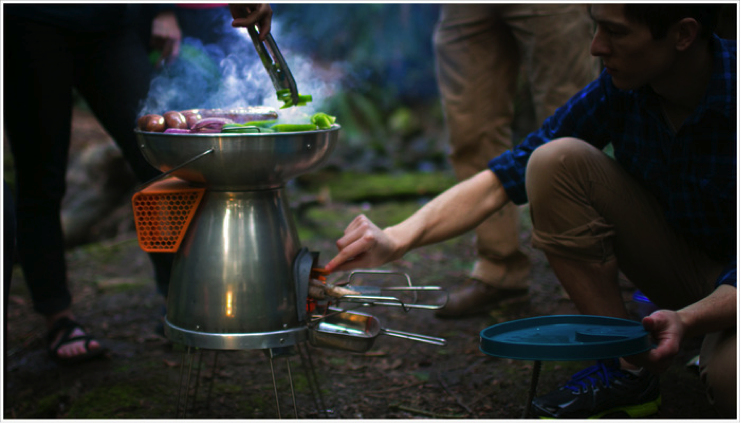
Credit: BioLite
BioLite technology has potential far beyond recreational use. After taking the company’s first product — the CampStove, which is a smaller version of the BaseCamp version meant for backpacking use — to a conference in 2009 the team realized that its product had immense potential to solve a problem in developing countries. Around three billion people cook and heat their homes using open fires and stoves with biomass and coal as fuel. The resulting air pollution causes illnesses that kill more than four million people annually.
Cleaner stoves is a key initiative of the U.S. Environmental Protection Agency. In a post on the department’s website it writes “As greenhouse gas emissions have increased, the smoke from kitchens in the developing world has escalated from a local to a worldwide threat. The average cooking fire produces about as much carbon dioxide as a car, and produces more soot, also known as black carbon. Reducing these emissions may be among the fastest, cheapest ways to fight global climate change.”
Black carbon contributes to an estimated 18 percent of the planet’s warming compared to 40 percent for carbon dioxide.
BioLite has developed four generations of low cost biomass cookstoves that reduce emissions while co-generating electricity. It currently sells thousands of HomeStoves through pilot retailers in India, Ghana, and Uganda.
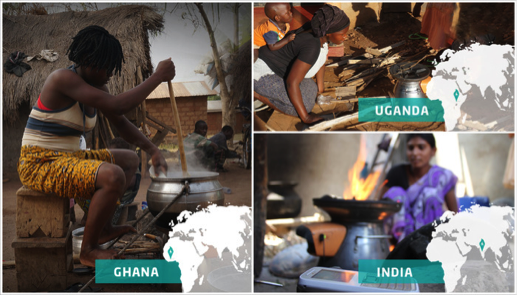
Credit: Biolite
Niwa – Smartphone Controlled Plant Growing System
With still 12 days to go in its campaign, Niwa has already surpassed its $100,000 Kickstarter campaign by raising nearly $125,000 from about 460 backers for its debut product: a smartphone-controlled home hydroponics system for growing fresh food, flowers and herbs without the use of soil. The Niwa growing system has a heater system, ventilation, smart lighting, climate control, automated irrigation and is connected to the cloud. With the accompanying app, users can water and feed plants, as well as interact with it to identify the plant’s stage of growth.
The app prompts users for answers to simple questions, such as whether flowers have appeared on the plant. It then reacts accordingly, adjusting settings to accommodate the next growth stage, such as changing the water, light and ventilation cycle. Backers can still buy a mini or large version for $249 and $299, respectively, which ship as early as January 2015.
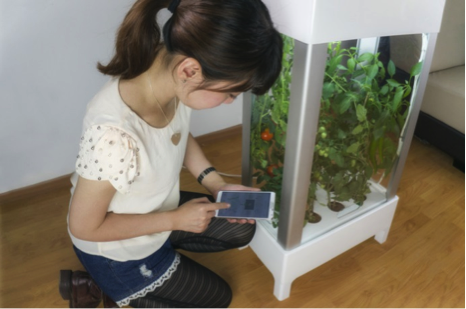
Credit: Niwa
The founding team spent four months before launching its Kickstarter campaign in Shenzhen, China with the accelerator, HAXLR8R, working with manufacturing partners to ensure an efficient manufacturing process.
Solar Roadways – Structurally Engineered Solar Panels as Roads
Startup Solar Roadways has almost doubled its initial Indiegogo campaign goal —raising a little more than $2 million from backers so far, exceeding its $1 million goal. The company launched the campaign in late April, which was supposed to run through May. It then extended it until June 20 to capture the mounting interest due in part to its Youtube video, “Solar Freakin Roadways.”
The video has been viewed more than 12 million times, an interest level that has propelled the company’s campaign to be among the top grossing on the Indiegogo site. Backers of the campaign receive a variety of memorabilia or their names etched into a Solar Roadway parking lot depending on the level of support, topping out at $10,000, which comes with a 7-inch hexagon working model.
The company envisions a world where its modular panels replace asphalt and concrete to save money on maintenance, while generating energy. The solar energy would power LEDs to mark lines, an alert system when debris or animals are on the road and a heating element to melt snow and ice. The company has also created a Cable Corridor system that stores, treats and transports storm water.
The company has received two phases of funding, including $100K in 2009 and $750K in 2011, from the U.S. Federal Highway Administration for research and development, the second of which involved a pilot parking lot. It also won GE’s first Ecomagination award in 2010. Solar Roadway founders are have turned to crowdfunding to fund production.
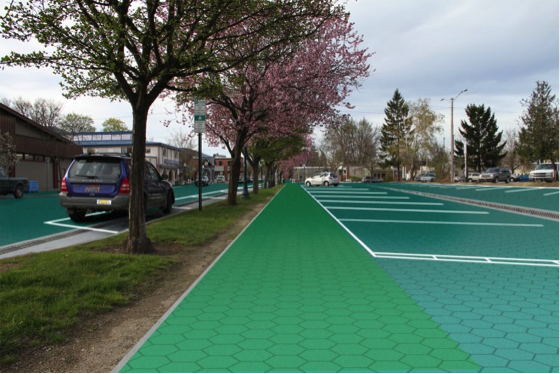
Artist’s rendition sidewalk with Solar Roadway panels, credit: Sam Cornett
Sensibo – Controlling A/Cs with a Smartphone
The Isreal startup, Sensibo, successfully reached its Indiegogo campaign goal of $70,000 with close to 4 weeks to go. So far the company has raised more than $92,000 from about 730 funders for its device that allows users to control their air conditioning units with a smartphone. Sensibo can be used with any A/C that has remote control.
The accompanying app offers users the ability to control A/C settings including temperature, humidity, sleep mode and fast cool. The most basic set up is priced at $99 and includes a smart hub and one Sensibo pods, expected delivery in January 2015. Sensibo has previously raised $15,000 in seed funding from angel investor Kima Ventures.
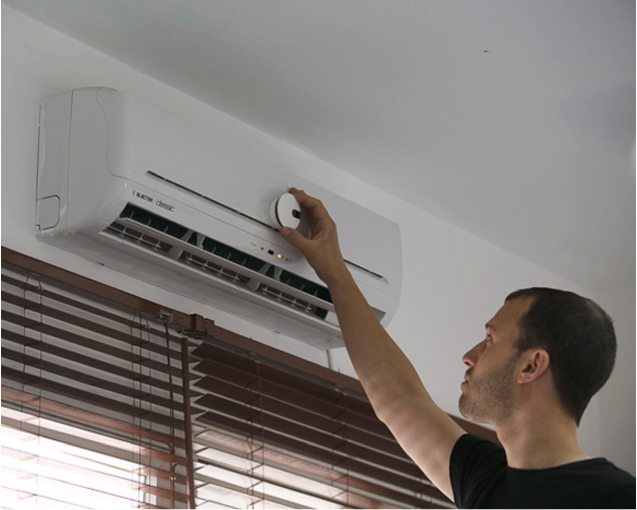
Credit: Sensibo